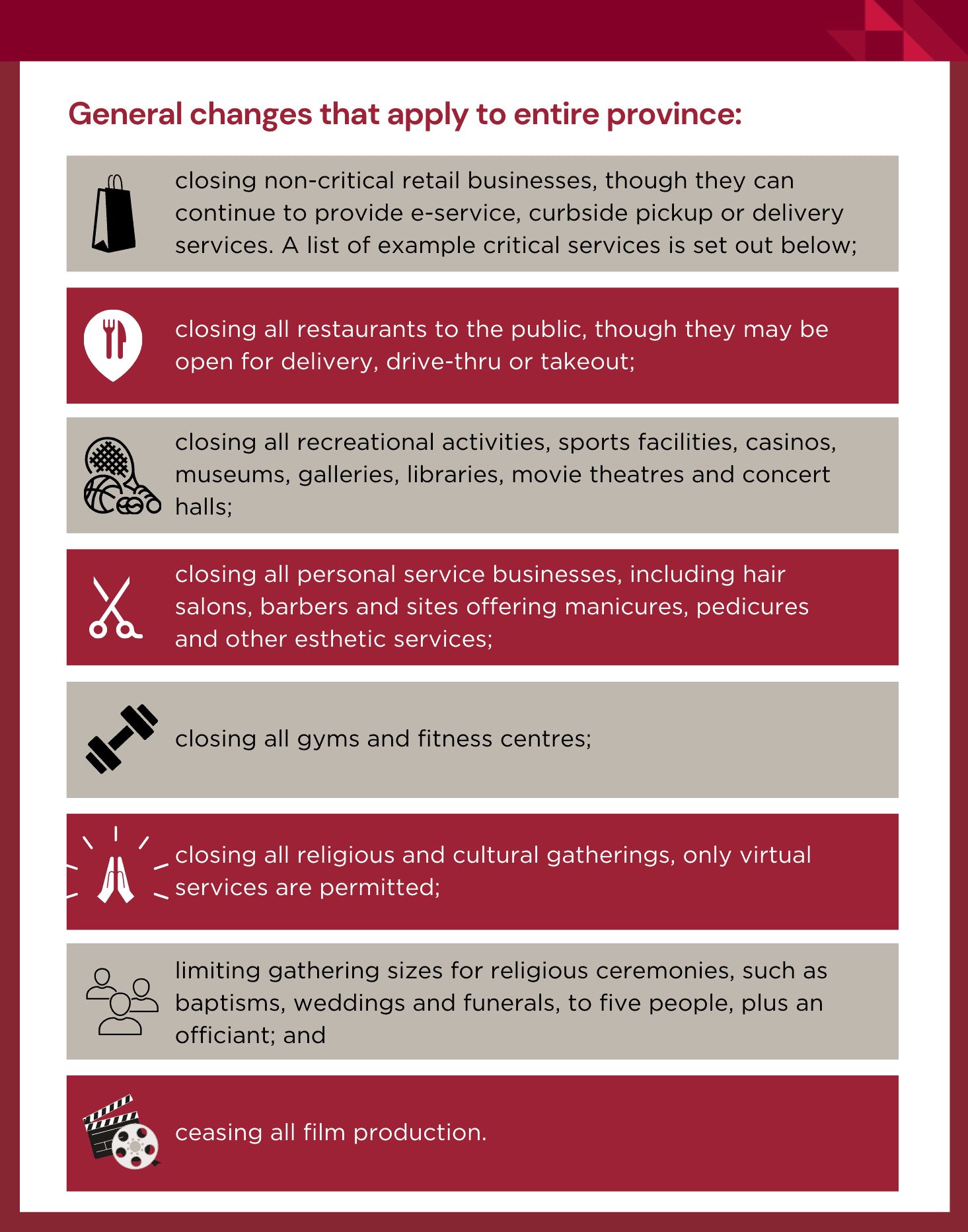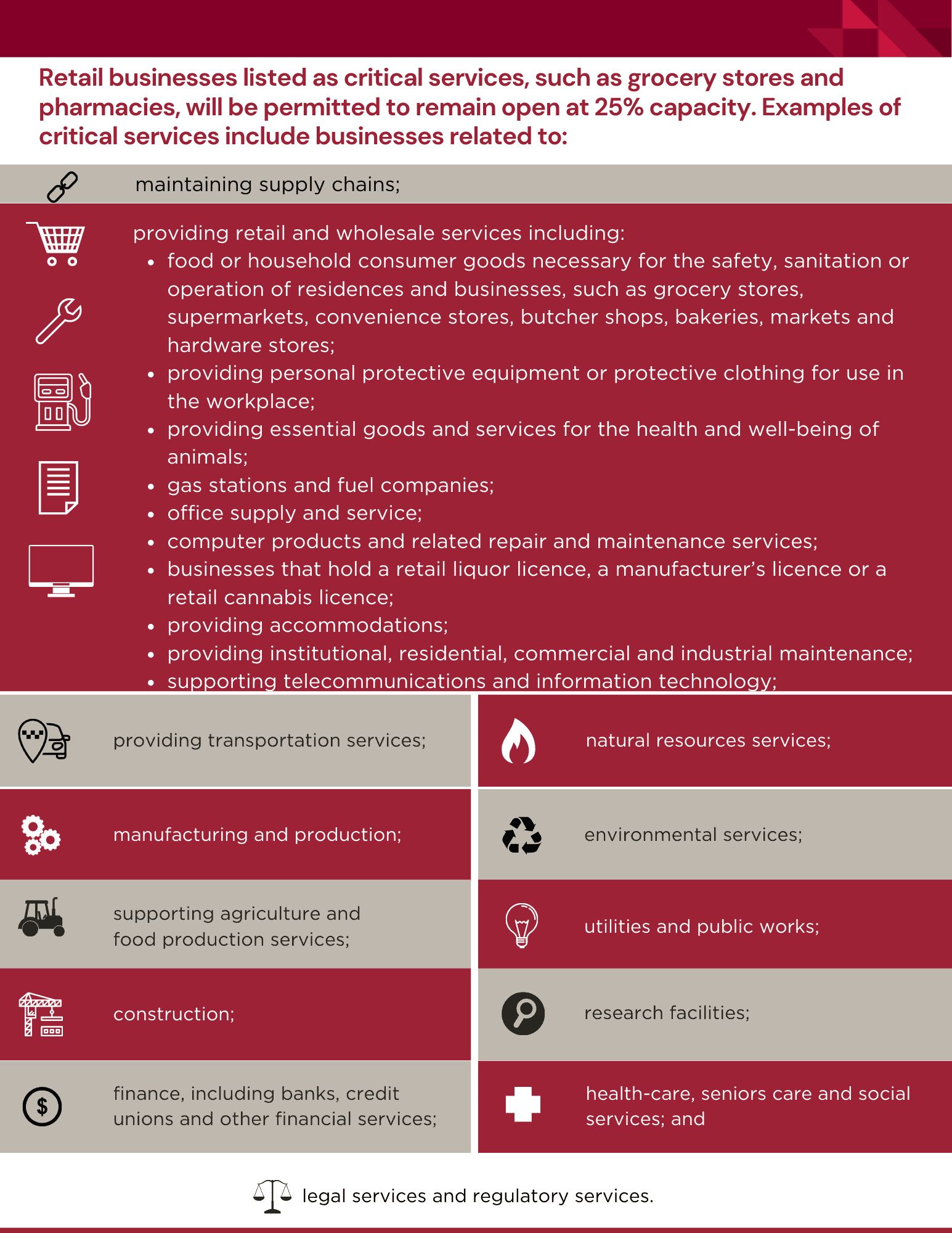On October 30 the Government of Manitoba announced province-wide changes to its #RestartMB Pandemic Response System in response to the surge of confirmed COVID-19 cases and the increasing test positivity rate.
Notably, such changes moved the Winnipeg Metro Region into the critical (red) level, and the Southern Health-Santé Sud, Prairie Mountain Health and Interlake-Eastern Health regions into the restricted (orange) level. On November 12, all health regions across Manitoba moved to the critical (red) level, and have since remained at this level.
Effective November 20, 2020, the province implemented stricter restrictions throughout the province relating to close contacts, gathering sizes and the retail sector, and has since issued a number of public health orders to that effect.
UPDATE: Effective Saturday, January 23, 2021, some public health restrictions will be eased or lifted in most regions of the province of Manitoba for a period of three weeks, with the exception of northern Manitoba. More details on the new public health orders and measures are set out in the section below.
We encourage employers, businesses and organizations to review the Manitoba Prevention Orders and the General Prevention Orders to ensure compliance with the sector-specific restrictions impacting their workplace, which can be accessed here and here.
January 23 Measures
On Saturday, January 23, modest changes to the current public health orders will take effect in most regions of the province until February 12, subject to the new General Prevention Orders. In northern Manitoba, however, the restrictions will not be eased and the region will be subject to the Northern Manitoba Prevention Orders.
The Northern Manitoba Prevention Orders and the General Prevention Orders issued on January 21 terminate and replace the previous public health orders issued on January 8. Across the province (northern Manitoba excepted), the following measures will be in effect on January 23.
Household Limits
A household may now (a) have two designated persons, either family members or friends, who can visit inside their household, and (b) have a visit of up to five people plus household members on their outdoor private property.
Up to 10 people may attend at a funeral in addition to the officiant.
Retail Operations
The essential items list has been eliminated, thereby allowing all stores to open for the sale of products. Store operators must ensure to maintain physical distancing and an occupancy limit of 25% or a maximum of 250 people, whichever is lower.
Health and Personal Services
Non-regulated health services, such as reflexologists, may reopen with adequate physical distancing and requirements to collect information for contact tracing purposes.
Barber shops and hair stylists may reopen at 25% capacity with adequate physical distancing and requirements to collect information for contact tracing purposes.
January 8 Measures
On January 8, the province announced that it would be extending the heightened measures implemented on December 9 for another two weeks. The Updated Manitoba Prevention Orders became effective January 8 and will remain in effect until January 22.
The Updated Manitoba Prevention Orders introduce a minor modification to allow for exemptions for all professional hockey teams to participate in games and training.
December 22 Measures
Olympic athletes in training are exempt from certain restrictions under public health orders.
December 12 Measures
The province extended the previous public health orders implemented on November 20 and introduced a number of changes that would remain in effect from 11:59 p.m. on December 11 until January 8, 2021.
The following is a summary of the public health measures:
Group Gatherings
In addition to the earlier exceptions, a person may enter another person's private residence for the purpose of moving a person into or out of that residence. If a person operates a business that is permitted to open under these orders at their private residence, other persons may attend at the person's residence for the purposes related to the operation of that business.
A person who is obtaining technical training at a university or college and who does not normally reside in the community where the university or college is located may reside at the private residence of another person in the community where the university or college is located.
The restrictions on group gatherings do not apply to an organized outdoor gathering (including those relating to places of worship) where persons attend in a motor vehicle, so long as:
- all persons stay in their motor vehicle at all times while at the site of the gathering or event;
- the persons in a motor vehicle do not interact with any person not in their motor vehicle while at the site of the gathering or events; and
- all persons in a motor vehicle reside in the same residence or receive caregiving services form another person in the motor vehicle.
Retail Business
Retail businesses may now open to sell seasonal items in addition to essential items. Seasonal items include holiday decorations, Christmas trees, wreaths and poinsettias, seasonal religious items, greeting cards and gift wrap and associated items. Seasonal items do not include toys, clothing or other items traditionally exchanged as gifts.
The order also expands essential items to include:
- medical uniforms and scrubs;
- mailing supplies; and
- school supplies such as pencils, pens, crayons, markers, calculators, paper and notebooks (excludes computers and other consumer electronic products).
Retail businesses which primarily sell used clothing, footwear, or household items are permitted to reopen.
Sporting and Recreational Activities
Persons may engage in individual or family outdoor sporting and recreational activities such as skating, tobogganing, skiing, snowmobiling and ice fishing.
Outdoor rinks may open. Hockey and ringette players may also practise individual skills and engage in casual play on outdoor rinks; however no organized games, practices or competitions are permitted.
Persons engaging in outdoor sporting or recreational activities must not engage in outdoor sporting activities in groups of more than five persons and must maintain a separation of at least two metres from each other, unless they reside in the same residence.
Indoor premises at a ski facility may open if the operator:
- implements measures to ensure that members of the public are reasonably able to maintain a separation of at least two meters from other members of the public at the premises; and
- ensures that members of the public only enter the indoor premises to store or obtain personal items, pick up or return rental gear or use the washrooms.
Ice fishing shacks may open if all persons using the shack reside in the same residence.
While all indoor sporting or recreational facilities must be closed, professional hockey teams and affiliated staff based in Manitoba may continue to practise and support operations.
Additional Changes
Acupuncturists and osteopathic therapists may accept patients and deliver health-care services.
Food banks and other charities or groups that provide or distribute food or hampers to persons in need may operate if measures are implemented to ensure that staff, volunteers and members of the public are able to adequately physically distance.
November 20 Measures
On November 19, 2020, the government of Manitoba announced that effective Friday, November 20, 2020, it would be implementing stricter restrictions throughout the province in response to the continued surge of COVID-19 cases.
The following measures were implemented:
Close Contacts and Group Gatherings
- a person who resides in a private
residence (including cottages and other vacation property) must not
permit a person who does not normally reside in that residence to
enter or remain in the residence, with the exception of the
following circumstances:
- a person who lives on their own may have one other person with whom they regularly interact attend at their private residence and may attend at the private residence of that one person;
- a person may enter a private
residence of another person to:
- provide health-care, personal care or home care services;
- allow a parent or guardian to visit a child who does not normally reside with that child;
- receive or provide child care;
- provide tutoring or other educational instruction;
- perform construction, renovations, repairs or maintenance;
- deliver items;
- provide real estate or moving services; or
- respond to an emergency
- a person is permitted to briefly enter onto the exterior portion of a person's property (for example, to drop off a delivery);
- people are prohibited from assembling in a gathering of more than five people at any indoor or outdoor public place or in the common areas of a multi-unit residence, with the exception of a health-care, social services and public and private school facilities, or critical business that adheres to health protection measures.
Retail Business
- a retail business may open but may
only sell essential items in person. By no later than 12:01 a.m. on
Saturday, November 21, operators of retail businesses must ensure
that:
- non-essential items are removed from areas of the business to which members of the public have access;
- members of the public are physically prevented from gaining access to non-essential items at the business; and
- signs in the business or stickers on items in the business clearly identify non-essential items that cannot be purchased by members of the public at the business
- The above requirements do not apply to retail businesses in northern Manitoba, except for retail businesses in Thompson, Flin Flon and The Pas.
- Essential items include:
- food, beverages and food preparation products;
- personal care products such as soap and dental care products;
- health-related products such as prescription drugs and vitamins;
- mobility or assistive devices;
- baby and child-care accessories such as diapers and formula;
- household cleaning products, safety devices, batteries and lightbulbs;
- outdoor winter apparel such as jackets and boots;
- personal protective equipment for the workplace;
- pet food and supplies;
- postage stamps;
- cellphones and cellphone accessories;
- parts and supplies for all types of motor vehicles and watercraft;
- major household appliances;
- hunting, fishing and trapping supplies;
- tools and hardware;
- materials for home maintenance, repair or construction; and
- property maintenance products such as shovels.
- Non-essential items refer to any good or product not set out in the orders, including jewelry, flowers, perfume, consumer electronics, sporting equipment, books and toys.
- Retail businesses must also:
- limit the number of members of the public shopping at the business to 25% of the usual capacity of the premises or 250 people, whichever is lower;
- implement measures to ensure that members of the public attending the business are reasonably able to maintain a separation of at least two metres from other members of the public;
- establish a system to ensure compliance with the capacity limits; and
- provide proof the capacity limits have not been exceeded on request from a person authorized to enforce these orders, at the time the request is made.
- Retail businesses may continue to sell essential or non-essential items online, by telephone or by remote means for delivery or curb-side pickup.
- These retail restrictions apply to businesses that are not addressed in Schedule A of the Updated Manitoba Prevention Orders. For example, liquor and cannabis stores may continue to open and sell products.
November 12 Measures
On November 10, the province announced that all health regions in Manitoba would be moving to the critical (red) level effective 12:01 a.m. on Thursday, November 12. Dr. Roussin indicated that the measures would be in effect for four weeks, which represents two incubation periods.
Public health orders were issued on November 11 (the "Manitoba Prevention Orders") and took effect at 12:01 a.m. on Thursday, November 12. The Manitoba Prevention Orders terminated and replaced the Capital Health Region and Southern Health Region Orders and the Updated General Orders issued on November 6. Further, the Manitoba Prevention Orders apply to all areas of Manitoba, and will remain in effect until 11:59 p.m. on December 11, subject to further extension or public health orders.
The Manitoba Prevention Orders do not apply to private and public schools. Further, in the event of any conflict between the Manitoba Prevention Orders and another order made under The Public Health Act that applies to a specific community or area, the other order prevails.
Public and Private Group Gatherings
The limit on public and private group gathering sizes remains at five people, and applies to ceremonies such as weddings and funerals, and informal gatherings such as dinners and house parties.
The province strongly recommends that Manitobans stay home and reduce their social contacts to household members only; however, the Manitoba Prevention Orders still allow gatherings of up to five people. Dr. Roussin discouraged Manitobans from having social gatherings or socializing with individuals outside of their household, and stated that gatherings of more than five people from outside a single household are subject to fines.
The five-person limit does not apply to:
- a facility where health care or social services are provided;
- household members for private gatherings inside the home;
- a business or facility that is allowed to open under public health orders if the operator of the business or facility has implemented measures in accordance with public health orders; and
- employees on the premises of a business or facility that is allowed to open under public health orders.
Closures & Religious Ceremonies

Critical Services

Travel & Self-Isolation
The travel and self-isolation restrictions remain unchanged from those set out in the public health orders issued on October 13. Travel to northern Manitoba continues to be restricted and non-essential travel is discouraged.
For more information on current travel and self-isolation restrictions, see our Manitoba travel restrictions blog.
Schools and Child-Care Services
There are no changes to child-care services or to the delivery of kindergarten to grade 12 education at this time.
Healthcare
For therapeutic care, regulated professions and massage therapists can continue to provide services.
Where non-urgent and elective surgeries and/or procedures may be impacted, patients will be contacted directly if their scheduled appointments or procedures are affected. Patients who are not contacted should show up to their appointments as scheduled.
In-patient visitation to hospitals or health centres will be suspended, with exceptions made on a case-by-case basis. Designated family caregivers may continue to visit personal care homes. General visitation may be suspended with exceptions in place for end-of-life care. General visitation to outdoor visitation shelters will be implemented, once operational.
Wearing of Face Masks
Face masks must be worn in all indoor public spaces and individuals must ensure that their mask covers their mouth, nose and chin without gapping.
The operator of an indoor public space must ensure that every person who is not wearing a mask while in the indoor public place is given a reminder to do so as soon as practicable.
To note, the following individuals are exempt from wearing a mask in indoor public spaces:
- children under the age of five;
- individuals with medical conditions unrelated to COVID-19, including breathing or cognitive difficulties, or a disability, that prevents them from safely wearing a mask;
- any person unable to put on or remove a mask without the assistance of another person; and
- persons who are seated, and
- the seating is arranged in accordance with the applicable requirements set out in the public health orders, or
- they are separated by at least two metres from other persons who are not sitting with that person, if the arrangement of seating in the place is not specifically addressed in the public health orders; and
- who wear a mask at all times while moving to or from their seated position within the indoor public place.
Further, employees or agents of the operator of an indoor public place are not required to wear a mask while they are:
- in an area of the indoor public place to which members of the public do not normally have access; or
- located behind a non-permeable physical barrier.
Individuals may temporarily remove their mask in certain circumstances, for instance when:
- receiving a service that requires removal of the mask;
- consuming food or drink;
- there is an emergency or medical purpose; and
- establishing their identity.
The public health orders relating to the wearing of face masks do not apply to child-care centres or child-care homes.
General Information
Effective November 12, and applicable province-wide, where an individual with symptoms of COVID-19 is required to self-isolate, all members of that individual's household must also self-isolate pending results of the COVID-19 testing. Further, any individual self-isolating in a household with more than one household member must self-isolate away from all members of that household to the greatest extent possible, for instance by staying in their own room, using their own bathroom, and not using common areas. Dr. Roussin indicated his understanding that this expanded self-isolation measure could result in greater absenteeism in workplaces in the interim.
Exemptions are in place for asymptomatic essential workers who are required to wear personal protective equipment while at work, including health-care workers, first responders, or teachers and educational assistants.
Individuals and employers need to take necessary steps to ensure compliance with orders made under The Public Health Act and The Emergency Measures Act. The province made amendments to the Preset Fines and Offence Descriptions Regulation ("PFODR") under The Provincial Offences Act to allow enforcement officers to issue tickets with set fines for failure to comply with the emergency orders. Effective October 21, total fine amounts were increased to $1,296 for tickets issued to individuals, including sole proprietorship s and partnerships, and $5,000 for tickets issued to corporations. As of November 18, individuals will face a specific fine of $298 if they fail to wear a mask in indoor public spaces.
On November 6, the province extended the state of emergency to December 6.
On November 5, and after public consultation, the Premier of Manitoba announced that the province would not be implementing a curfew at this time. Premier Pallister further announced expanded measures for the enforcement of public health orders.
Critical (Red) Level (before November 12)
Public health orders were issued for the City of Winnipeg and surrounding areas, and the Southern Health-Santé Sud health region, on November 6 (the "Capital Region and Southern Health Region Orders"), which can be accessed here. The Capital Region Orders issued on November 1 terminated and replaced the Capital Region and Southern Health Region Orders issued on November 6. Effective 12:01 a.m. on Monday, November 9, the City of Winnipeg and surrounding areas, and the Southern Health-Santé Sud health region, were in the critical (red) level of the province's pandemic response system, and would remain in the critical (red) level until 12:01 a.m. on November 23, subject to further extension and new public health orders.
In addition to the above noted changes, employers, including the public service, were encouraged to have employees work from home wherever possible.
The following measures remained unchanged while the Winnipeg Metro and Southern Health-Santé Sud health regions were in the critical (red) level:
- public and private group gathering sizes remain at five, however, the province has indicated that limiting contacts from outside one's household is strongly encouraged;
- no changes for grocery stores and pharmacies, which may continue to operate at 50% capacity;
- no changes for schools: blended learning for grades 9 to 12, voluntary blended learning temporarily available for kindergarten to grade 8, and encouraging as much physical distancing as possible;
- casinos remain closed; and
- no change for personal services and maintaining 50% capacity remains.
Certain communities across the province, such as Cross Lake First Nation, Peguis First Nation, and Little Grand Rapids First Nation, also moved to the critical (red) level in October and November.
Restricted (Orange) Level (before November 12)
Public health orders were issued for all regions outside of the Winnipeg Metro and Southern Health-Santé Sud health regions on November 6 (the "Updated General Orders"), which terminated and replaced the General Orders issued on November 1, and can be accessed here. The Updated General Orders applied to the Northern, Prairie Mountain and Interlake-Eastern health regions, which continued to be in the restricted (orange) level since November 2, and would remain in the restricted (orange) level until 12:01 a.m. on November 16, subject to extension and further public health orders.
To note, and as stated above, the Capital Health Region and Southern Health Regions Orders and the Updated General Orders issued on November 6, were terminated and replaced by the new Manitoba Prevention Orders issued on November 11.
The content of this article is intended to provide a general guide to the subject matter. Specialist advice should be sought about your specific circumstances.



